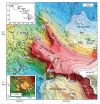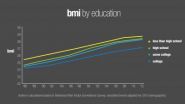(Press-News.org) BALTIMORE – May 21, 2014. Researchers at the University of Maryland School of Medicine have identified a mutation in a fat-storage gene that appears to increase the risk for type 2 diabetes and other metabolic disorders, according to a study published online today in the New England Journal of Medicine.
The researchers discovered the mutation in the hormone-sensitive lipase (HSL) gene by studying the DNA of more than 2,700 people in the Old Order Amish community in Lancaster County, Pa. HSL is a key enzyme involved in breaking down stored fat (triglycerides) into fatty acids, thereby releasing energy for use by other cells.
"We found that Amish people with this mutation have defects in fat storage, increased fat in the liver, high triglycerides, low "good" (HDL) cholesterol, insulin resistance and increased risk of developing type 2 diabetes," says the study's senior author, Coleen M. Damcott, Ph.D., an assistant professor of medicine in the Division of Endocrinology, Diabetes and Nutrition and member of the Program for Personalized and Genomic Medicine at the University of Maryland School of Medicine.
In this study, 5.1 percent of the Old Order Amish study participants had at least one copy of the mutation. Four people had two copies of the mutation and consequently produced no HSL enzyme, Dr. Damcott says. The mutation is less common in non-Amish Caucasians of European descent (0.2%), thus the higher prevalence of the mutation in the Amish makes it possible to characterize its full range of effects.
"Future studies of this gene will allow us to look more closely at the effects of its deficiency on human metabolism to better understand the function of the HSL protein and its impact on fat and glucose metabolism," Dr. Damcott says. "These studies will also examine the potential of using HSL as a drug target for treating type 2 diabetes and related complications."
She notes that type 2 diabetes is a complex disease whose susceptibility is often determined by interactions between genetics and lifestyle factors, such as overeating and physical inactivity. Susceptibility genes for diabetes may be involved in several different metabolic pathways in the body, including storage and release of fat for energy. "Discovery of this mutation adds to the growing list of insights gained from genomic studies that can be used to develop new treatments and customize existing treatments for type 2 diabetes and related metabolic disorders," Dr. Damcott says.
Co-author Alan R. Shuldiner, M.D., the John L. Whitehurst Endowed Professor of Medicine, associate dean for personalized medicine and director of the Program for Personalized and Genomic Medicine, and his colleagues at the University of Maryland School of Medicine have previously identified a number of susceptibility genes for diabetes as well as for obesity, high blood pressure and other complex diseases. In 2008, they discovered a novel gene mutation among the Old Order Amish population that significantly reduces the level of triglycerides in the blood and appears to help prevent cardiovascular disease. Dr. Shuldiner's team has been conducting genetic research with the Old Order Amish in Pennsylvania since the early 1990s.
The Old Order Amish are ideal for genetic studies because they are a genetically homogenous population who trace their ancestry back 14 generations to a small group who came to Pennsylvania from Europe in the mid-1700s.
INFORMATION:
About the University of Maryland School of Medicine
Established in 1807, the University of Maryland School of Medicine is the first public medical school in the United States, and the first to institute a residency training program. The School of Medicine was the founding school of the University of Maryland and today is an integral part of the 11-campus University System of Maryland. On the University of Maryland's Baltimore campus, the School of Medicine serves as the anchor for a large academic health center which aims to provide the best medical education, conduct the most innovative biomedical research and provide the best patient care and community service to Maryland and beyond. http://www.medschool.umaryland.edu.
The school's Program for Personalized and Genomic Medicine Program was established in April 2011 to help facilitate the pace of discovery in personalized and genomic medicine; to accelerate the translation of these new discoveries to improve patient care; and to enhance the training and education of future generations of physicians and scientists. The program is funded jointly by the School of Medicine and University of Maryland Medical Center.
Jessica S. Albert, Ph.D., Laura M. Yerges-Armstrong, Ph.D.,Richard B. Horenstein, M.D., Toni I. Pollin, Ph.D., Urmila T. Sreenivasan, M.S., Sumbul Chai, M.S., William S. Blaner, Ph.D., Soren Snitker, M.D., Ph.D., Jeffrey R. O'Connell, Ph.D., Da-Wei Gong, Ph.D., Richard J. Breyer III, M.D., Alice S. Ryan, Ph.D., John C. McLenithan, Ph.D., Alan R. Shuldiner, M.D.,Carole Sztalryd, Ph.D., and Coleen M. Damcott, Ph.D.
Univ. of MD researchers identify fat-storage gene mutation that may increase diabetes risk
Study in Old Order Amish found that mutation interferes with key enzyme in lipid metabolism
2014-05-22
ELSE PRESS RELEASES FROM THIS DATE:
Ka'ena Volcano: First building block for O'ahu discovered
2014-05-22
Boulder, Colo., USA – Researcher John Sinton of the University of Hawai'i along with colleagues from the Monterrey Bay Aquarium and the French National Center for Scientific Research have announced the discovery of an ancient Hawaiian volcano. Now located in a region of shallow bathymetry extending about 100 km WNW from Ka'ena Point at the western tip of O'ahu, this volcano, which they have named Ka'ena, would have risen about 1,000 meters above sea level 3.5 million years ago.
Sinton and colleagues have found compelling evidence beneath the sea that this long-lived ...
Intuitions about the causes of rising obesity are often wrong, researchers report
2014-05-22
CHAMPAIGN, Ill. — Everything you think you know about the causes of rising obesity in the U.S. might be wrong, researchers say in a new report.
Contrary to popular belief, people are exercising more today, have more leisure time and better access to fresh, affordable food – including fruits and vegetables – than they did in past decades. And while troubling disparities exist among various groups, most economic, educational, and racial or ethnic groups have seen their obesity levels rise at similar rates since the mid-1980s, the researchers report.
The new analysis appears ...
Review says inexpensive food a key factor in rising obesity
2014-05-22
ATLANTA May 22, 2014—A new review summarizes what is known about economic factors tied to the obesity epidemic in the United States and concludes many common beliefs are wrong. The review, authored by Roland Sturm, PhD of RAND Corporation and Ruopeng An, PhD, of the University of Illinois at Urbana-Champaign, notes that paradoxically, rising obesity rates coincided with increases in leisure time, increased fruit and vegetable availability, and increased exercise uptake. The review appears early online in CA: A Cancer Journal for Clinicians and finds at least one factor ...
Scientists find new way to combat drug resistance in skin cancer
2014-05-22
RAPID RESISTANCE to vemurafenib – a treatment for a type of advanced melanoma, the deadliest form of skin cancer – could be prevented by blocking a druggable family of proteins, according to research* published in Nature Communications today (Thursday).
Scientists at the Cancer Research UK Manchester Institute, based at the University of Manchester, have revealed the MLK family of four enzymes 'undoes' the tumour-shrinking effects of vemurafenib**.
Around half of metastatic melanomas – aggressive skin cancer that has spread to other parts of the body – are caused by ...
Canada funds 65 innovative health projects to help save every woman, every child
2014-05-22
Grand Challenges Canada, funded by the Government of Canada, today announces investments of $12 million in projects worldwide, aimed squarely at improving the health and saving the lives of mothers, newborns and children in developing countries.
From a "lucky iron fish" placed in tens of thousands of Asian cooking pots to reduce anemia, to "motherhood insurance" to ensure that poverty doesn't impede emergency care if needed during a baby's delivery, to kits for home farming edible insects to improve nutrition in slums of Africa and Latin America, the 65 imaginative projects ...
New insights into premature ejaculation could lead to better diagnosis and treatment
2014-05-22
There are many misconceptions and unknowns about premature ejaculation in the medical community and the general population. Two papers, both being published simultaneously in Sexual Medicine and the Journal of Sexual Medicine, provide much-needed answers that could lead to improved diagnosis and treatment for affected men.
Premature ejaculation can cause significant personal and interpersonal distress to a man and his partner. While it has been recognized as a syndrome for well over 100 years, the clinical definition of premature ejaculation has been vague, ambiguous, ...
Could cannabis curb seizures? Experts weed through the evidence
2014-05-22
The therapeutic potential of medical marijuana and pure cannabidiol (CBD), an active substance in the cannabis plant, for neurologic conditions is highly debated. A series of articles published in Epilepsia, a journal of the International League Against Epilepsy (ILAE), examine the potential use of medical marijuana and CBD in treating severe forms of epilepsy such as Dravet syndrome.
In a case study, Dr. Edward Maa, Chief of the Comprehensive Epilepsy Program at Denver Health in Denver, Colo., details one mother's experience of providing medical marijuana to her child ...
Scientists announce top 10 new species for 2014
2014-05-22
SYRACUSE, N.Y. — An appealing carnivorous mammal, a 12-meter-tall tree that has been hiding in plain sight and a sea anemone that lives under an Antarctic glacier are among the species identified by the SUNY College of Environmental Science and Forestry's (ESF) International Institute for Species Exploration (IISE) as the top 10 species discovered last year.
An international committee of taxonomists and related experts selected the top 10 from among the approximately 18,000 new species named during the previous year and released the list May 22 to coincide with the birthday, ...
Temperature influences gender of offspring
2014-05-22
Whether an insect will have a male or female offspring depends on the weather, according to a study led by Joffrey Moiroux and Jacques Brodeur of the University of Montreal's Department of Biological Sciences. The research involved experimenting with a species of oophagous parasitoid (Trichogramma euproctidis), an insect that lays its eggs inside a host insect that will be consumed by the future larvae. "We know that climate affects the reproductive behaviour of insects. But we never clearly demonstrated the effects of climate change on sex allocation in parasitoids," Moiroux ...
Decision to jettison end of life Liverpool Care Pathway 'too extreme'
2014-05-22
The decision to jettison the approach to care of the dying, known as the Liverpool Care Pathway (LCP), was "too extreme," given that its principles are widely regarded as among the best examples of palliative care in the world, argues a senior ethicist in the Journal of Medical Ethics.
The LCP, which was intended to transfer the principles of hospice care to hospitals, fell foul of poor application by healthcare professionals and widespread misunderstanding of its scope and purpose among the general public, argues Dr Anthony Wrigley of the Centre for Professional Ethics ...
LAST 30 PRESS RELEASES:
Scientists reveal our best- and worst-case scenarios for a warming Antarctica
Cleaner fish show intelligence typical of mammals
AABNet and partners launch landmark guide on the conservation of African livestock genetic resources and sustainable breeding strategies
Produce hydrogen and oxygen simultaneously from a single atom! Achieve carbon neutrality with an 'All-in-one' single-atom water electrolysis catalyst
Sleep loss linked to higher atrial fibrillation risk in working-age adults
Visible light-driven deracemization of α-aryl ketones synergistically catalyzed by thiophenols and chiral phosphoric acid
Most AI bots lack basic safety disclosures, study finds
How competitive gaming on discord fosters social connections
CU Anschutz School of Medicine receives best ranking in NIH funding in 20 years
Mayo Clinic opens patient information office in Cayman Islands
Phonon lasers unlock ultrabroadband acoustic frequency combs
Babies with an increased likelihood of autism may struggle to settle into deep, restorative sleep, according to a new study from the University of East Anglia.
National Reactor Innovation Center opens Molten Salt Thermophysical Examination Capability at INL
International Progressive MS Alliance awards €6.9 million to three studies researching therapies to address common symptoms of progressive MS
Can your soil’s color predict its health?
Biochar nanomaterials could transform medicine, energy, and climate solutions
Turning waste into power: scientists convert discarded phone batteries and industrial lignin into high-performance sodium battery materials
PhD student maps mysterious upper atmosphere of Uranus for the first time
Idaho National Laboratory to accelerate nuclear energy deployment with NVIDIA AI through the Genesis Mission
Blood test could help guide treatment decisions in germ cell tumors
New ‘scimitar-crested’ Spinosaurus species discovered in the central Sahara
“Cyborg” pancreatic organoids can monitor the maturation of islet cells
Technique to extract concepts from AI models can help steer and monitor model outputs
Study clarifies the cancer genome in domestic cats
Crested Spinosaurus fossil was aquatic, but lived 1,000 kilometers from the Tethys Sea
MULTI-evolve: Rapid evolution of complex multi-mutant proteins
A new method to steer AI output uncovers vulnerabilities and potential improvements
Why some objects in space look like snowmen
Flickering glacial climate may have shaped early human evolution
First AHA/ACC acute pulmonary embolism guideline: prompt diagnosis and treatment are key
[Press-News.org] Univ. of MD researchers identify fat-storage gene mutation that may increase diabetes riskStudy in Old Order Amish found that mutation interferes with key enzyme in lipid metabolism


